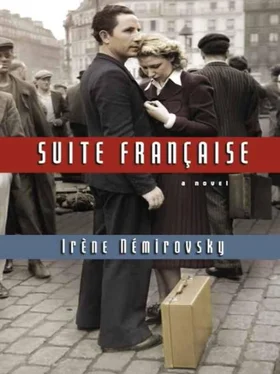17 May 1941
Irène Némirovsky to Robert Esménard
Dear Monsieur Esménard, my brother-in-law told me that you gave him the 24,000 francs you were to send me on 30 June. Thank you so much for your extreme kindness towards me.
2 September 1941
Michel Epstein to the Sous-Préfet of Autun [8]
I have received a letter from Paris informing me that anyone categorised as Jewish may not leave the village where he resides without permission from the authorities.
I find myself in this situation, along with my wife, since, even though we are Catholics, we are of Jewish descent. I therefore am taking the liberty of requesting that you please authorise my wife, born Irène Némirovsky, as well as myself, to spend six weeks in Paris where we also have a home, 10 avenue Constant-Coquelin, for the period from 20 September to 5 November 1941.
This request is made as my wife needs to sort out some business with her publisher, visit the ophthalmologist who has always treated her, as well as seeing the doctors who care for us, Professor Vallery-Radot and Professor Delafontaine. We intend to leave our two children, aged four and eleven, in Issy and, of course, we would like to be sure that there will be no problem returning to Issy, once we have attended to our affairs in Paris.
Doctor in Issy: A. Bendit-Gonin.
[8] Since the department of Saône-et-Loire was divided by the demarcation line, it was the Sous-Préfet who took the place of the Préfet in the occupied section, where the village of Issy-l 'Evêque was located.
8 August 1941
From the Progrès de l'Allier no. 200
SOVIET, LITHUANIAN, ESTONIAN AND LATVIAN RESIDENTS ORDERED TO REPORT TO REGIONAL GERMAN HEADQUARTERS
Every male resident over the age of fifteen of Soviet, Lithuanian, Estonian or Latvian extraction, as well as those who are stateless but who previously held Soviet, Lithuanian, Estonian or Latvian citizenship, are ordered to report in person to their Regional German Headquarters with their identity papers no later than Saturday 9 August 1941 (noon). Anyone who does not report in person will be penalised according to the decree concerning this order.
The Field Commandant.
9 September 1941
Irène Némirovsky to Robert Esménard
I have finally rented the house I wanted here, which is comfortable and has a lovely garden. I am moving in on 11 November if these Gentlemen don't get there first for we are once again expecting them.
13 October 1941
Irène Némirovsky to Robert Esménard
I was happy to receive your letter this morning, not just because it confirms my hope that you will do everything possible to help me, but also because it reassures me that someone is thinking about me, which is a great comfort.
As you can imagine, life here is very sad, and if it weren't for my work…
Even the work becomes painful when the future is so uncertain…
14 October 1941
Irène Némirovsky to André Sabatier [9]
My dear friend, I was very touched by your kind letter. Please do not think that I underestimate either your friendship or M. Esménard's; on the other hand, I perfectly understand the difficulties of the situation. Up until now, I have shown as much patience and courage as I could possibly muster. But, what can you do, there are moments which are very difficult. These are the facts: impossible to work and must be responsible for four people's lives. Added to that are stupid humiliations-I cannot go to Paris; I cannot have even the most basic necessities sent here, such as blankets, beds for the children etc., my books. A general and absolute prohibition has been declared regarding the apartments inhabited by people like me. I'm not telling you this to make you feel sorry for me, but to explain to you why my thoughts can only be dark […]
[9] Literary Director of Albin Michel Publishers. (Editor)
27 October 1941
Robert Esménard to Irène Némirovsky
I have explained your situation to my father-in-law and have also shown him the letters you recently sent me.
As I have told you, A. Michel only wishes to be of service to you in any way possible and he has asked me to offer you a monthly payment of 3,000 francs for the year 1942 which is the same amount he was sending you when it was still possible to publish your works and sell them regularly. Please be so kind as to confirm your agreement.
However, I must point out to you that in accordance with very precise instructions we received from the Syndicat des Éditeurs (Publishers' Union) regarding the interpretation of directives included in the German Decree of 26 April, article 5, we find ourselves in the position of being required to send all royalties received from the sale of Jewish authors' works to their "blocked account." According to this principle, it is stated that "publishers must pay royalties to Jewish authors by sending them to their bank account after receiving confirmation from the bank that the account is blocked."
In addition, I am returning the letter you received from GIBE Films (a copy of which I have kept). According to information I received from a reliable source, a project of this type can only be undertaken if the author of the book to be adapted to the screen is of Aryan origin, both in this zone and the other.[10] I can therefore only be involved in such a project when the author whose work is to be made into a film provides me with the most formal guarantee on this point.
[10] Reference to the Free Zone and the Occupied Zone.
30 October 1941
Irène Némirovsky to Robert Esménard
I have just received your letter offering me a monthly payment of 3,000 francs for the year 1942. I greatly appreciate Monsieur Michel's attitude towards me. I am truly most grateful both to him and to you; the faithful friendship you both have shown me is as precious to me as the material support you wish to give me by doing this. However, you know that if this money must be held in a blocked bank account, it would be of no use to me whatsoever.
I wonder if under the circumstances, it would not be simpler to send the monthly payments to my friend, Mlle Dumot,[11] who lives with me and is the author of a novel entitled Les Biens de ce Monde [12] whose manuscript is with Monsieur Sabatier. […]
Mlle Dumot is definitely Aryan and can give you any proof of this you may require. I have known her since I was a child and if she could come to an agreement with you about the monthly payments, she would look after my interests. […]
[11] Irène Némirovsky and her husband, Michel Epstein, had brought Julie Dumot to Issy-l'Évêque in case they were arrested. She had been the live-in companion of the children's maternal grandparents. (Editor)
[12] This work was actually written by Irène Némirovsky and was published in instalments in the newspaper Gringoire in 1941 without mentioning the author's name. Published in novel form in 1947 by Albin Michel with Irène Némirovsky as author.
Telegram from Michel Epstein to R. Esménard and A. Sabatier 13 July 1942
Irène suddenly taken today destination Pithiviers[13] (Loiret)-hope you can intercede urgently-trying to telephone no success. Michel Epstein.
Telegram from R. Esménard and A. Sabatier to Michel Epstein July 1942
Just received your telegram. Immediately making joint effort by Morand, Grasset, Albin Michel. Yours.
[13] Pithiviers, near Orléans, was one of the infamous concentration camps where children were separated from their parents and imprisoned, while the adults were processed and deported to camps further away, usually Auschwitz.
Irène Némirovsky's final two letters: [14]
Читать дальше

![Константин Бальмонт - Константин Бальмонт и поэзия французского языка/Konstantin Balmont et la poésie de langue française [билингва ru-fr]](/books/60875/konstantin-balmont-konstantin-balmont-i-poeziya-francuzskogo-yazyka-konstantin-balmont-et-thumb.webp)










